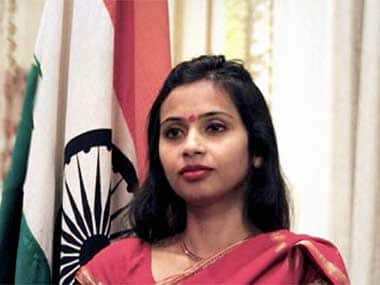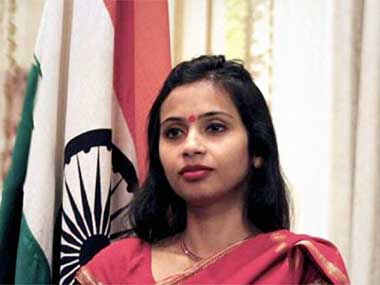New York: The ugly America treatment shown Devyani Khobragade has created such bad blood that several visits by Obama administration officials are looking increasingly doubtful. With the diplomatic row stretching into its third week with little sign of resolution, India is in no mood to put out silver flatware and dine US officials at Hyderabad House in New Delhi. This has not stopped the US State Department from angling for invites and applying subtle pressure on New Delhi to host Nisha Desai Biswal, the US Assistant Secretary of State for South and Central Asia. “Our Assistant Secretary certainly looks forward to visiting India as soon as possible,” State Department Deputy Spokesperson Marie Harf told reporters in Washington. [caption id=“attachment_1317323” align=“alignright” width=“380”]
 PTI[/caption] Biswal, who is Washington’s first Indian American point-person for crafting US policy on South and Central Asia, announced during her swearing-in ceremony in November that she planned to visit India soon, her first country as assistant secretary of state, whenever the “calendars” could be synchronized. “Schedule of her visit is yet to be announced,” an Indian diplomat said cryptically. “Dates have not been fixed.” L’Affaire Khobragade threatens to damage what has otherwise been a decade of careful collaboration between the two countries as they deepen trade and defense ties. “The first casualty of this new Cold War is the proposed trip of US Assistant Secretary of State for South Central Asia, Nisha Biswal Desai, whose visit is now on hold,” Chidanand Rajghatta wrote in The Times of India. “Energy Secretary Ernest Moniz is due in New Delhi on January 15 for the bilateral energy dialogue but even that may fizzle out if there is no resolution to the case before January 13 when Khobragade is due to be indicted in court,” added Rajghatta. Instead of thinking it is business as usual, the Obama administration should pay closer attention to India’s new ambassador to Washington, S Jaishankar, who worked on the landmark US-India civil nuclear deal. Jaishankar used his very first meeting with US officials last month to emphasize that the “stalemate” in bilateral ties would continue till the Khobragade case was resolved in a “respectful” manner. This appears to have cut no ice with the Obama administration which is still “reviewing” the paperwork that the State Department received from the United Nations on the transfer of Khobragade to India’s Permanent Mission to the UN in New York. “There’s a judicial process, a legal process underway, and I don’t have any estimates for how long that will all take to play out. There’s also our diplomatic discussions as well. Just nothing new to announce or guess about here today,” Harf said. The US is also sitting on a loaded missive from India stating that Khobragade was actually notified to the United Nations as a member of India’s delegation to the UN General Assembly in September, even as she was serving as India’s deputy consul general in New York. Indian lawyers say that if Khobragade was in fact an UN-credentialed ‘Advisor’ to the Permanent Mission of India in September then she had full immunity from arrest in December and can actually sue the US for an unconstitutional false arrest. In what some have described as “gross overreach of judicial authority” by Manhattan Attorney Preet Bharara, Khobragade was handcuffed and arrested in front of her daughter’s school on December 12 and then strip-searched by US Marshals. She was held in a cell before being freed on a $250,000 bail. Whichever way you look at it, it’s hard to justify treating a diplomat in a wage dispute like a hardened criminal. Although American and Indian diplomats are negotiating at lower levels to resolve the issue, the Obama administration has allowed the Khobragade case to snowball into an ugly mess. If it drags on indefinitely it could be a wrecking ball for the bilateral relationship. President George W. Bush succeeded in bringing India out of the nuclear cold, but President Obama hasn’t been able to hold on to the gains of the Bush years. His biggest achievement is that the US has sold close to $8 billion worth of arms to India in the last five years. Not surprisingly, the Khobragade row has really knocked the US Department of Defense for a loop. The Pentagon has expressed its dismay over the way Bharara and Co. needlessly humiliated Khobragade during her arrest in New York jeopardizing long-term US-India ties.
PTI[/caption] Biswal, who is Washington’s first Indian American point-person for crafting US policy on South and Central Asia, announced during her swearing-in ceremony in November that she planned to visit India soon, her first country as assistant secretary of state, whenever the “calendars” could be synchronized. “Schedule of her visit is yet to be announced,” an Indian diplomat said cryptically. “Dates have not been fixed.” L’Affaire Khobragade threatens to damage what has otherwise been a decade of careful collaboration between the two countries as they deepen trade and defense ties. “The first casualty of this new Cold War is the proposed trip of US Assistant Secretary of State for South Central Asia, Nisha Biswal Desai, whose visit is now on hold,” Chidanand Rajghatta wrote in The Times of India. “Energy Secretary Ernest Moniz is due in New Delhi on January 15 for the bilateral energy dialogue but even that may fizzle out if there is no resolution to the case before January 13 when Khobragade is due to be indicted in court,” added Rajghatta. Instead of thinking it is business as usual, the Obama administration should pay closer attention to India’s new ambassador to Washington, S Jaishankar, who worked on the landmark US-India civil nuclear deal. Jaishankar used his very first meeting with US officials last month to emphasize that the “stalemate” in bilateral ties would continue till the Khobragade case was resolved in a “respectful” manner. This appears to have cut no ice with the Obama administration which is still “reviewing” the paperwork that the State Department received from the United Nations on the transfer of Khobragade to India’s Permanent Mission to the UN in New York. “There’s a judicial process, a legal process underway, and I don’t have any estimates for how long that will all take to play out. There’s also our diplomatic discussions as well. Just nothing new to announce or guess about here today,” Harf said. The US is also sitting on a loaded missive from India stating that Khobragade was actually notified to the United Nations as a member of India’s delegation to the UN General Assembly in September, even as she was serving as India’s deputy consul general in New York. Indian lawyers say that if Khobragade was in fact an UN-credentialed ‘Advisor’ to the Permanent Mission of India in September then she had full immunity from arrest in December and can actually sue the US for an unconstitutional false arrest. In what some have described as “gross overreach of judicial authority” by Manhattan Attorney Preet Bharara, Khobragade was handcuffed and arrested in front of her daughter’s school on December 12 and then strip-searched by US Marshals. She was held in a cell before being freed on a $250,000 bail. Whichever way you look at it, it’s hard to justify treating a diplomat in a wage dispute like a hardened criminal. Although American and Indian diplomats are negotiating at lower levels to resolve the issue, the Obama administration has allowed the Khobragade case to snowball into an ugly mess. If it drags on indefinitely it could be a wrecking ball for the bilateral relationship. President George W. Bush succeeded in bringing India out of the nuclear cold, but President Obama hasn’t been able to hold on to the gains of the Bush years. His biggest achievement is that the US has sold close to $8 billion worth of arms to India in the last five years. Not surprisingly, the Khobragade row has really knocked the US Department of Defense for a loop. The Pentagon has expressed its dismay over the way Bharara and Co. needlessly humiliated Khobragade during her arrest in New York jeopardizing long-term US-India ties.
Khobragade row leaves US official visits to Delhi in limbo
Uttara Choudhury
• January 7, 2014, 10:35:08 IST
L’Affaire Khobragade threatens to damage what has otherwise been a decade of careful collaboration between the two countries as they deepen trade and defense ties.
Advertisement
)
End of Article